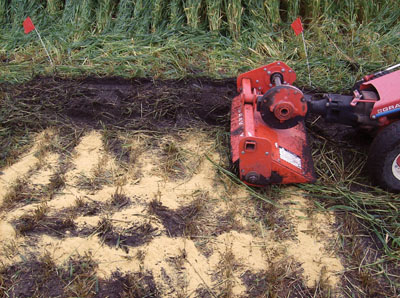
Features
Agronomy
Corn
The green manure alternative
Potato crops require large amounts of most inputs and potato growers seek economical alternatives for what this high-value crop requires.
April 28, 2010 By Rosalie I. Tennison
Potato crops require large amounts of most inputs and potato growers seek economical alternatives for what this high-value crop requires. Green manure is being touted as an option to provide additional nutrients and increase the soil’s physical properties. As well, it has been proved that green manure is a natural nematicide and can improve yield and tuber quality. But, for Canadian growers, there is often no window of opportunity to seed a green manure between harvest and the onset of winter. The same is true for potato growers in the northern United States. But a researcher at Washington State University in Prosser, has learned that the same results can be achieved by using mustard seed meal, saving growers the effort of growing mustard for green manure. “By using mustard seed meal, which is a byproduct from the biodiesel industry, growers don’t need to grow green manure if it doesn’t fit with their cropping practices,” explains Dr. Ekaterini Riga. “In Washington state, growers harvest late, so there is no time to grow green manure; the same is true for Canada.”
 |
| Although usually considered a green manure, mustard may become useful for its seed meal, a byproduct of the ethanol industry. Photo courtesy of University of Manitoba. |
Primarily, brassica seed is used in the biodiesel industry and after the oil is extracted the meal remains. She adds that the meal contains glucosinolates that degrade to nematicides once it is incorporated into the soil.
Riga is collaborating with MPT Mustard Products and Technologies of Saskatoon, Saskatchewan, to develop a commercial mustard meal product that can be incorporated into the soil using standard fertilizer equipment. The best time to apply the product, according to Jay Robinson of MPT, is 14 days prior to planting. The mustard meal product, which has yet to be named and receive PMRA registration, shows great promise at reducing or controlling soil borne pathogens, such as rhizoctonia, fusarium, verticillium and pythium. In addition, it makes use of a byproduct that would normally cause concern over its proper disposal.
“This product can also control soil borne pests, such as nematodes, and tests have shown that the use of our product reduces potato scab and blight,” Robinson reports. “The product also includes nutrients and organic matter that encourage microbiological activity, plant growth and increased yield.”
“Mustard seed meal has some nitrogen in it, which becomes available to the plant,” Riga adds. Using the meal will be much easier than growing green manure, especially in the northern United States and Canadian potato growing areas, she continues.
Since the product is still under development cost analyses have not been completed, but Riga believes if the price is competitive it will become a very useful product for potato growers. She adds that, if MPT is successful in getting the product registered, it will be a good alternative to synthetic nematicides. She says meal offers one disadvantage in that there could be phytotoxicity problems as a result of its use. However, in greenhouse trials there was no phytotoxicity recorded.
According to Robinson, the mustard seed meal product fits well into operations where environmental stewardship is a high priority. “All the materials used in this product are renewable and are grown in an environmentally acceptable manner,” he explains.
Therefore, the product is a good fit in any sustainable agricultural practice.
Growers wanting to have the benefits of a green manure crop prior to planting potatoes but rarely have the opportunity, due to weather conditions, to grow a green manure crop effectively, will be able to get the same benefits by using the mustard seed meal product when it is available. Riga expects to have the results from her field tests analyzed in early 2010 and MPT is working on field tests to obtain data to support its application for registration. Therefore, while the product sounds promising and could offer potato growers many benefits, there is no time line on when it will be available commercially.
Green manures are a valuable tool assisting growers to produce high-quality, high-yielding potato crops. A commercial product that can be applied similarly to fertilizer that reduces the time and effort required to grow a green manure crop with the same benefit is bound to be attractive to potato growers across the country.